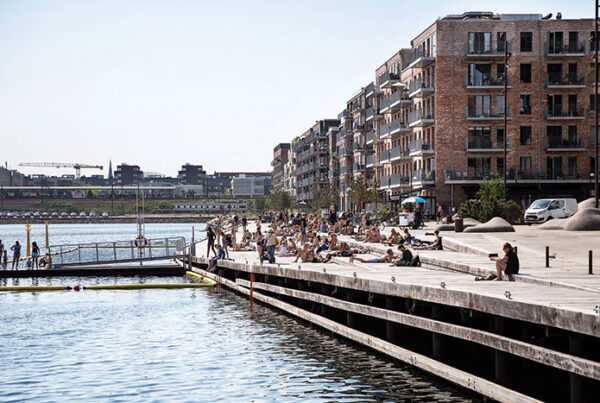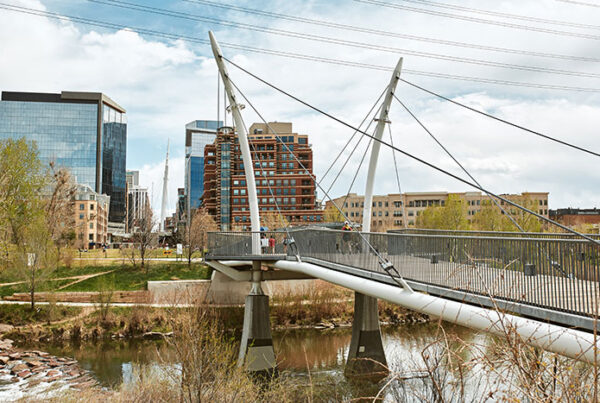Representatives of nearly 200 nations gathered for the United Nations Climate Change Conference, held earlier this month in Glasgow, Scotland, signing a joint agreement to further reduce the impact of global warming.
During a recent ULI webinar “COP26: Key Takeaways for Real Estate,” participants said that the private sector is moving forward on curbing carbon emissions, but that more political action is still needed.
As moderator Brad Dockser, chief executive officer and co-founder of Green Generation, pointed out, U.S. President Joe Biden and former President Barack Obama spoke at the international conference, as well as Barbados Prime Minister Mia Mottley. The latter was among those representing countries that would be hardest hit by climate change, said Dockser.
“In some cases, some of the Pacific Islands may very well disappear if climate change is not addressed very quickly,” he said.
Dockser said stakeholders in the real estate community have a clearer outlook of the future regarding climate change. “We know where things are going,” said Dockser, who is also a global governing trustee of ULI and on the Global Advisory Board for ULI’s Center for Sustainability and Economic Performance. “Whether we like it or not is a secondary issue. We do know where things are going to end up because the time for talking about where we might go is really done.”
In summary, Dockser said it was agreed upon that: global capital markets are aligned with net zero carbon; $130 trillion of capital was committed to the transition to net zero; and there was a pledge to cut methane emissions 30 percent by 2030 as well as halting and reversing deforestation. As it stands now, according to Dockser, the private sector is ahead of some government policies.
Dockser said in the future, the capital markets will not, for example, finance coal and the insurers say they will not insure coal, “so if countries say we’re going to phase out coal slowly, it no longer matters, because there is not going to be money to develop new projects and operate them and insure them and think about risk.”
There is still much debate surrounding what government officials are willing to do or what they will not do. However, Dockser said banks, developers, financial institutions, investors, and tenants have, for the most part, already decided it is vital to address climate change now.
“What we didn’t see, and this is the really important part, in COP26 in Glasgow was really how to do any of these things,” Dockser said.
That includes, for example, how to limit global temperature increases to 1.5-degrees Celsius. The level of commitments that were made were actually not enough to keep the temperature at 1.5-degrees Celsius, Dockser pointed out.
While there are climate control initiatives in the legislation that passed in the House of Representatives as part of the Build Back Better Act, some say it is not enough. The Build Back Better Act must now be voted on by the U.S. Senate.
“It’s not all the climate that people wanted,” Dockser said. “It’s not all the climate the progressives think we need, and we’re finding it very challenging to get full and meaningful legislation passed in the United States.”
During COP26, it was not agreed upon about how to: phase down coal, make sure all industrialized countries pass climate legislation, provide funding for the most vulnerable nations around the world, and control climate change’s impact on developing countries.
“There’s a broad feeling that the countries who have caused climate change, and the United States has created the largest amount of emissions historically, need to find ways to provide funding to the most vulnerable countries,” Dockser added.
Some have already begun to attempt to make plans to move even entire countries to new locations as a result of climate change, he said. There were also no solutions as to how to lessen the impact of climate change on the less developed countries. The implementation of Article Six, which Dockser described as “the mechanism around how we’re going to create global carbon markets basically offset trading,” was also not agreed upon at the conference.
However, COP26 offered a surprise this year when China’s top climate envoy Xie Zhenhua agreed to work with U.S. climate envoy John Kerry to release a joint statement. It includes a plan to fight deforestation and work toward meeting the 1.5-degree Celsius temperature goal, according to some news reports.
“It was far more than expected but, honestly, much less than what is needed,” Dockser said.
When it comes to the real estate industry combating climate change in Canada, Derek Goring, executive vice president of development at Northcrest Developments in Toronto, said his company takes their role seriously. It has been tasked with developing more than 500 acres on the local Downsview Airport lands on behalf of the Public Sector Pension Investment Board which has a focus on environmental, social and governance measures.
“Because of the long-term nature of our project, we know we have to make sure that we’re building and designing these new communities to last and be protecting from an obsolescence perspective by making good decisions on things like our carbon footprint,” Goring said. “So that by the time the buildings that we build are actually up and running and operating, that they are meeting the regulations in the future, not the regulations of today.”
Faron Hill, president of Atlanta-based commercial real estate advisory Peregrine Oak, said in the Southeast people are also weighing the importance of climate change. This despite the fact the region of the country is not considered to be as progressive when it comes to protecting the environment.
There have been no governmental mandates regarding climate change for utility providers, for example. There is some slow movement toward solar, however, according to Hill.
“I think technology is going to be the key and extremely important,” Hill said, looking toward the future. “Europe from 1990-2019, their economy increased by 78 percent, and they reduced emissions by 44 percent so this is real. It’s possible.”
Attend the next complimentary webinar on COP26 and decarbonization hosted by ULI Asia Pacific.
Fifth Wall: 4 Key Takeaways for the Real Estate Industry from COP26


